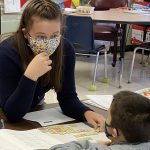Interdisciplinary collaboration between the Neag School, co-created by Sandra Chafouleas, and Ballard Institute goes high tech with the help of the UConn Tech Park, to the benefit of children across the state.
Interdisciplinary collaboration between the Neag School and Ballard Institute goes high tech with the help of the UConn Tech Park, to the benefit of children across the state.
This week, Eyewitness News is getting advice on how to help students who are going to school for the first time or moving from one school to another. Tuesday we’re focusing on helping kids transition from elementary to middle school. It can be challenging. It’s not just the next grade. It’s a new building, a new time of day, a different routine with more freedom, and more responsibilities.
Enduring the turmoil of a global pandemic for more than two years now, many of us have struggled. We can recognize the importance of self-care and wellness, but not everyone has necessarily adopted a daily meditation practice or quit their late-night doomscrolling. By now, though, perhaps we can admit to ourselves one thing: It’s OK to not be OK in every moment.
“School assignments that a student is expected to do outside of the regular school day—that’s homework,” says Sandra Chafouleas, a UConn Board of Trustees Distinguished Professor at the Neag School of Education. “The general guideline is 10 minutes of nightly homework per grade level beginning after kindergarten. This amounts to just a few minutes for younger elementary students to up to 2 hours for high school students.”
“School assignments that a student is expected to do outside of the regular school day—that’s homework,” says Sandra Chafouleas, a UConn Board of Trustees Distinguished Professor of Educational Psychology. “The general guideline is 10 minutes of nightly homework per grade level beginning after kindergarten. This amounts to just a few minutes for younger elementary students to up to 2 hours for high school students.”
“Whenever and however you celebrate, having a holiday season is important for wellbeing,” says UConn Board of Trustees Distinguished Professor Sandra Chafouleas. “Holidays set aside time for relaxation, reflection and reliable traditions — a trio that has become increasingly important as the world has gotten more chaotic and less predictable. Whether you approach them from a spiritual, social or cultural perspective, celebrating holidays can offer a ‘super big dose’ of positive emotions like joy, gratitude, serenity, hope, pride and love.
Sue O’Connell hit the streets to find out about people’s holiday traditions. She also spoke with Neag School of Education Professor Sandra Chafouleas about how important these rituals are to the holiday season.
As a psychologist and a parent of children participating in youth sports, it has been exciting for me to witness the increasing media attention on mental health and athletics. Mental toughness has long been a central topic within sports circles, but the current discussions are different. The past year has brought the mental health and well-being of athletes into mainstream conversation, whether it be as a plotline in season two of Apple TV’s “Ted Lasso” (promise, no more spoilers!), professional athletes’ stories highlighted during World Mental Health Day, or Simon Biles’ withdrawal from events at the Tokyo Olympics.
“As a psychologist and a parent of children participating in youth sports, it has been exciting for me to witness the increasing media attention on mental health and athletics. Mental toughness has long been a central topic within sports circles, but the current discussions are different. The past year has brought the mental health and well-being of athletes into mainstream conversation, whether it be as a plotline in season two of Apple TV’s “Ted Lasso” (promise, no more spoilers!), professional athletes’ stories highlighted during World Mental Health Day, or Simon Biles’ withdrawal from events at the Tokyo Olympics,” says Sandra Chafouleas, a UConn Board of Trustees Distinguished Professor of Educational Psychology in the Neag School of Education.




